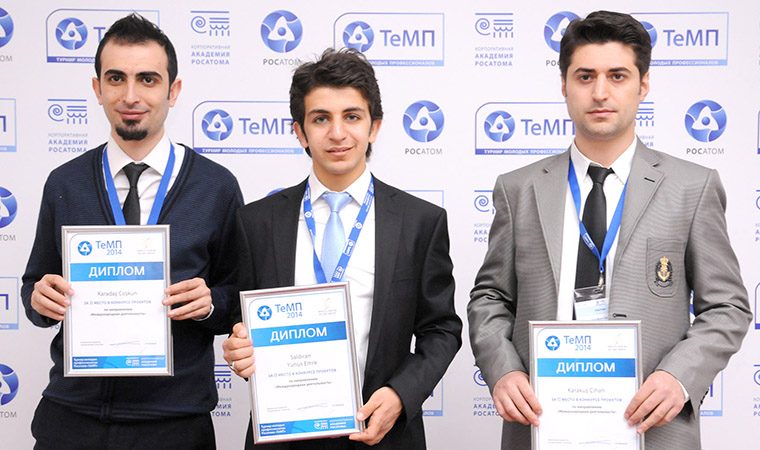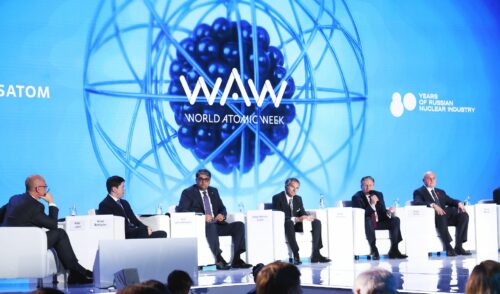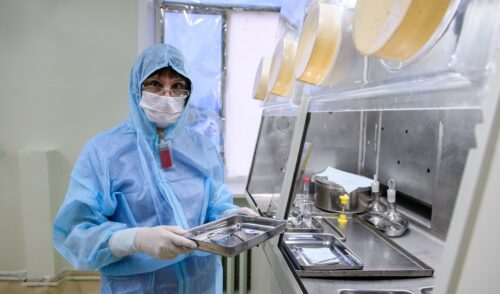
Top-notch staff
back to contentsRosatom has established a three-level staff training system to transfer Rosatom’s values to the countries which have just embarked on the road of nuclear energy. The first level is for managers of national nuclear programs. “This is a top category covering people responsible for the overall direction of national development and selection of a nuclear vendor country,” explains Vladimir Artisyuk, Prorector for International Affairs at Rosatom’s Central Institute for Continuing Education and Training (CICET). The second category covers technical staff having competencies required to work at nuclear facilities. The third category includes students. “This approach will unlock great potential in about fifteen years. They study seven years in the university, then work at a nuclear facility, reach managerial positions, and influence decisions in the national nuclear industry one way or another,” argues Mr. Artisyuk.
CICET is a primary educational facility for managers from the countries where Rosatom introduces nuclear technologies. “In fact, competition over management training is intense between nuclear vendor countries because it is an opportunity to give first-hand information about nuclear programs and establish working contacts to promote technologies. The world’s best practice is to train top managers from emerging nuclear power countries under the auspices of IAEA,” says Vladimir Artisyuk.
At its 55th regular session of the IAEA General Conference, IAEA, CICET and Rosenergoatom, an operator of Russian NPPs, signed a trilateral agreement to assist countries in improving nuclear infrastructure. At the same time, Rosatom CEO Sergei Kirienko announced the establishment of an international training center for emerging nuclear countries (CICET) in Obninsk.
CICET offers 22 English-language training courses lasting from two to four weeks. At the request of Rosenergoatom’s Nuclear Infrastructure Project Office earlier this year, CICET began developing 19 new training courses on each component of the nuclear infrastructure – from developing a national standpoint on nuclear energy to equipment deliveries. A group of IAEA trainees from Ghana, Bangladesh and Jordan completed a VVER safety training course at CICET in late April.
Closed cycle
An advanced training consortium was established to train technical staff. The consortium includes four organizations – Rosenergoatom, CICET, Atomtekhenergo (a Russian leader in NPP commissioning and management) and VNIIAES (Russian Research Institute for NPP Operations). They used to contact foreign customers separately, and decided to join their efforts to improve training quality as the number of NPP construction contracts began to grow.
“Former students cannot start working at a power plant right after the graduation; they have to be trained for a particular position at the consortium centers,” explains Elena Nagibina, Head of International Cooperation and Export of Nuclear Education Services Project implemented by Rosatom’s HR Management.
With only graduate students admitted, the training course lasts several years. Students are trained at Atomtekhenergo centers where they have an opportunity to study unique equipment, work on true-to-life simulators and get theoretical knowledge. Then they start an internship at nuclear power plants and, finally, learn how to behave in non-routine and abnormal situations on VNIIAES simulators. “The first students, mostly Vietnamese, will graduate in 2017. Rosatom has recently made an NPP construction agreement with Finland. Finnish specialists will be trained here in the English language,” adds Vladimir Artisyuk.
Young people in focus
For the last five years, with the number of overseas projects growing, Rosatom has significantly increased the enrollment of foreign students majoring in nuclear-related fields. Students study in 14 core universities headed by the National Nuclear Research University. Foreign students strive to study in Russia and far outperform available university places.
The education course lasts a total of seven years. Students study Russian for one year and then began mastering their profession. Subsequent internship at one of Rosatom’s companies is obligatory. Students are paid a monthly allowance and provided with a room in the dormitory and medical insurance. “We teach students both for a particular position at a power plant and for general development of the nuclear infrastructure and awareness in emerging nuclear energy countries,” stresses Elena Nagibina.
Rosatom began teaching the first foreign students after the agreement was signed with Vietnam to build a nuclear power plant and related infrastructure. “29 students from Vietnam came to the National Nuclear Research University in 2010,” Elena says. “Last year we had 230 students from 16 countries and plan to enroll 300 new students from 36 partner countries this year. Each year we increase foreign student quotas. The Government supports us by providing the required number of university places.” Furthermore, Rossotrudnichestvo, a Russian agency for CIS affairs and international humanitarian cooperation, and the Ministry of Education petitioned the Russian Government to increase the foreign student quota by a third to promote the Russian national interests on the global scale.
Russian nuclear education differs from Western training programs in this field. Russian universities offer students a unique opportunity to major in the design, engineering and operation of nuclear power plants. “This education gives all knowledge and skills required to work at a nuclear station. After the university course is completed, students do an internship, being trained for a specific position, and only then are ready to work. In other countries, nuclear education is often supplementary, which makes the qualification of Russian engineers much higher,” explains Elena Nagibina.
The faster the national nuclear industry develops, the more interested local students grow in the opportunity to study in Russia. For example, 6,100 applications were submitted earlier this year for just 80 university places to study for the Akkuyu Project. “This is more than 70 for each position. We are able to select the most talented students,” says Elena Nagibina. Brazilian students are also developing increasing interest in Russian education.
Joint university programs are another area of international cooperation in the field of nuclear training and education. Graduate students receive two diplomas – from a Russian university and a university from a partner country. “Both Russian and foreign students can be enrolled. This is a kind of international campus,” Elena adds.
“Tens of thousands professionals are needed to develop, construct and operate the nuclear infrastructure in an emerging nuclear energy country,” explains Rosatom’s HR Director Tatiana Terentieva. “Low qualification poses risk to nuclear safety. As a responsible vendor, Rosatom assists its partners in planning and training human resources for their national nuclear programs. Foreign student training in leading Russian universities is a strategic task for Rosatom. We are interested in providing our overseas projects with qualified professionals trained to Russian educational standards. This is why we pay special attention to the quality and contents of education programs for foreign students.”




